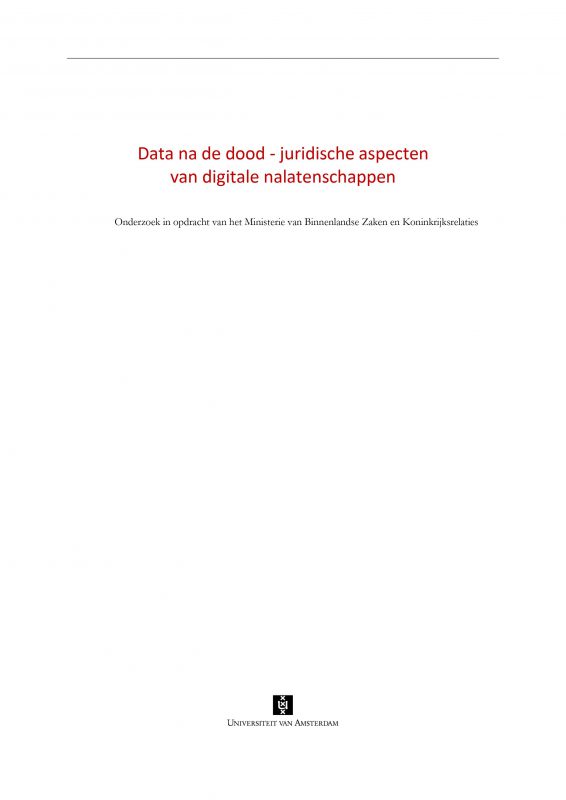Data after death
legal aspects of digital inheritances
Just about everyone these days leaves an online footprint. What should happen to our digital stuff when we die? Digital Legal Lab member prof. Mireille van Eechoud (University of Amsterdam) recently had a report published for the Dutch Ministry of the Interior on legal aspects of digital inheritances.
More than 150,000 people pass away each year in the Netherlands, and about the same number of estates are settled. Almost without exception, the deceased leave behind digital ‘assets’ such as social media accounts, e-mails, documents stored in the cloud and (user rights to) all kinds of media and entertainment. The question that arises is whether the current Dutch legal framework offers sufficient levers to safeguard the private and public interests involved in the settlement of digital estates. To answer this question, researchers from the Institute for Information Law (IViR), in collaboration with the Private Law department of the Faculty of Law of the University of Amsterdam, recently completed a report for the Ministry of the Interior and Kingdom Relations on the legal aspects of digital inheritances.
The central research question of the study is: what adjustments to the Dutch legal framework, if any, are desirable to adequately protect private and public interests involved in the settlement and liquidation of digital estates? To answer this question, first an analysis was made of relevant terms & conditions that providers of commonly used information services apply, and of their policies regarding death. The analysis included user agreements, general terms and conditions, privacy policies and other available company documents. Information service providers were categorized into digital media services (commercial offerings such as streaming video or music), communication services (including social media and messaging services) and ICT services (including cloud storage and digital safes). Next, the relevant legal framework is described, and ambiguities therein are identified. In addition to inheritance law, this concerns contract law and, in particular, consumer law, intellectual property rights (especially copyright), personality rights and data protection law (General Data Protection Regulation). General property law is also important, insofar as it relates to the question whether digital assets are part of the estate. Finally, with a view to formulating possible solutions, a selection of legislation in other countries was studied.
The study was conducted by a team of experts from different legal disciplines: Prof. Mireille van Eechoud (Information Law, research lead) Prof. Barbara Reinhartz (Inheritance Law), Prof. Chantal Mak (Property Law and Fundamental Rights), Prof. Marco Loos (Consumer Law and Contract Law), Dr. Jef Ausloos (Data Protection), Luna Schumacher (Information Law), and Lotte Pol (Information Law). The study was carried out in the context of the Digital Transformation of Decision-Making research initiative at the Faculty of Law of the University of Amsterdam, focusing on questions related to AI and public values, data governance and online platforms.
the report
The report is available online in Dutch, with an English summary. Click below to read it.
